

Dr Nathalie DIAGNE
Chercheur ISRA/CNRA
Mes activités de recherches portent sur la valorisation agro-sylvo-pastorale de terres dégradées par le sel. Nous sélectionnons des biofertilisants (champignons mycorhiziens, bactéries fixatrices d’azote, PGPR …) capables d’améliorer les performances des plantes tolérantes au sel. Nous menons aussi des études pour mieux comprendre les mécanismes (physiologiques et moléculaires) impliqués dans la tolérance au sel des plantes et microorganismes symbiotiques. Des tests pilotes sont effectués au niveau des terres salées pour la réhabilitation et l’amélioration des services écosystémiques avec ces outils biologiques (couples plantes/microorganismes tolérants au sel).
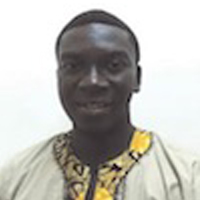
Mouhamadou Moussa Diangar
PhD in Plant Breeding
Axe de recherche:
Les objectifs de sélection actuels du programme sont de développer (i) des lignées à haut rendement pour les zones sujettes à la sécheresse, aux insectes et aux champignons et (ii) des cultivars présentant des caractéristiques intéressantes pour les agriculteurs et autres consommateurs.
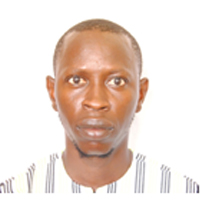
Ghislain KANFANY
PhD plant breeding- Pearl millet breeder
Axe de recherche:
Dr Ghislain Kanfany is an agronomist and a plant breeder trained in Senegal (ENSA) and Ghana (WACCI). I contributed to the development and dissemination of several rice varieties resistant to salinity and cold with high grain yield across African countries under the STRASA project using conventional and molecular breeding approaches. I was involved in the implementation of the AfricaRice hybrid breeding program. During my thesis, I identify several sources of resistance for downy mildew, study their combining ability and identifies genomic regions associated to this disease. Currently, I am conducting several pearl millet breeding activities including the development of varieties, inbred lines, varietal evaluation and seed production. I am also acting as the coordinator of the Cereals research program.
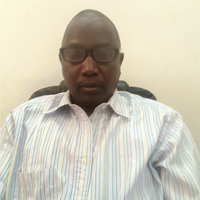
Dr Ousmane SY
PhD on Agronomy and crop breeding
My current researches activities focus on “Pearl millet breeding and genetic resource conservation and utilization”. Basically, we collect accessions from rural area and introduce lines and varieties from collaborative research institutions, we conduct agronomical and genetically characterization of these accessions and we keep them save for a long time in freezer and cool rooms. Inr breeding activities, the accessions, lines or varieties, according to the research objectives, are screened and the best are selected and used on recombination to produce high yielding and resistant to biotic and abiotic stress varieties, etc.
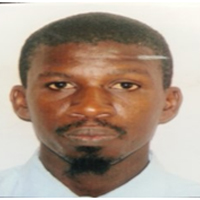
Dr Demba DIAKHATE
PhD en Hydraulique et en Machinisme agricole
Mes activités de thèse avaient porté sur l’“Implantation d’un système de culture et adaptation d’un semoir pour le semis direct aux conditions du Sénégal ». L’objectif de cette thèse était de contribuer à la mise au point d’une méthode de lutte biologique pour lutter contre la dégradation des sols et la baisse de fertilité des sols. La méthodologie avait constituée à faire en première lieu une caractérisation des pratiques culturales ayant trait avec l’agriculture de conservation et de la traction animale au niveau dans le Sud du Bassin Arachidier. En deuxième lieu à concevoir un semoir de semis direct sous couvert végétal version super éco suivant la méthode « expérimentation-modification » développée par Havard(1994) et en troisième lieu à tester le semoir de semis direct version super éco dans un essai de couverture végétale avec l’emploi de de trois variétés de Brachiaria en provenance du Brésil. Les résultats ont montré :
la brachiaria ruziziensis n’est pas capable de survivre à la longue saison sèche mais les brachiarias brizantha et decumbens ayant un système racinaire profond sont capables de résistées.
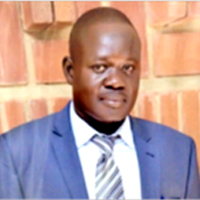
Dr Dioumacor FALL
PhD on Soil Microbiology and Plant Physiology
My current researches activities focus mainly on (i) study of the adaptation mechanisms of plants to drought and salinity, (ii) the diversity of symbiotic microorganisms (rhizobia and mycorrhiza), (iii) the improvement of plant productivity, especially in degraded lands through the use of symbiotic microorganisms and (iv) the use of agroforestry technologies and organic amendments to improve agricultural productivity in the degraded lands of Senegal.
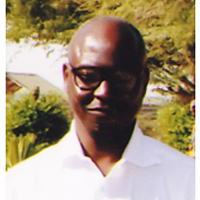
Dr Ibrahima SARR
PhD on Agronomy and crop breeding
Capacity building & Training: Students and farmers in crop production and protection
The research and training activities are crosscutting in integrated crop production and protection for cereals, legumes, vegetables & fruits the most environmentally friendlier way. They are related to identifying resistant varieties or lines for the development of IPM tools or for the breeders to incorporate in their programs. It included as well the research and development of beneficial for the control of pests like the pearl millet headminer or other lepidopteron pests attacking both cereals and vegetable fruits (fall army worm, corn earworm etc.). The research is also related identifying bottlenecks and evaluating technologies for drying and storing grains like maize and groundnut enabling the reduction of post-harvest losses and contamination by mycotoxins for instance. Findings allowed the development of specific tools for capacity building and training of extension officers and farmers on GAP for good quality and safer products so on.
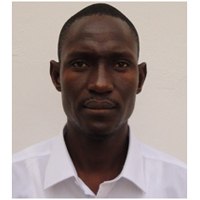
Dr Issa FAYE
PhD on Peanut Genetics and Breeding
My breeding program is aimed at developing or selecting high yielding varieties with improved drought tolerance, better seed quality including oil composition, through genetics and molecular breeding. During the last five years, we have been routinely implementing marker-assisted selection for developing short duration varieties with resistance to leaf spots, rust and with high oleic content. We’re working with our partners to expand this list of traits to other key traits including earliness and fresh seed dormancy for improving peanut productivity and production in Senegal.
Dr Gualbert Séraphin DOREGO
Mes activités de thèse avaient porté sur l’“Implantation d’un système de culture et adaptation d’un semoir pour le semis direct aux conditions du Sénégal ». L’objectif de cette thèse était de contribuer à la mise au point d’une méthode de lutte biologique pour lutter contre la dégradation des sols et la baisse de fertilité des sols. La méthodologie avait constituée à faire en première lieu une caractérisation des pratiques culturales ayant trait avec l’agriculture de conservation et de la traction animale au niveau dans le Sud du Bassin Arachidier. En deuxième lieu à concevoir un semoir de semis direct sous couvert végétal version super éco suivant la méthode « expérimentation-modification » développée par Havard(1994) et en troisième lieu à tester le semoir de semis direct version super éco dans un essai de couverture végétale avec l’emploi de de trois variétés de Brachiaria en provenance du Brésil. Les résultats ont montré :
la brachiaria ruziziensis n’est pas capable de survivre à la longue saison sèche mais les brachiarias brizantha et decumbens ayant un système racinaire profond sont capables de résistées.
Dr Ciré Elimane SALL
Biométricien
My current researches activities focus mainly on (i) study of the adaptation mechanisms of plants to drought and salinity, (ii) the diversity of symbiotic microorganisms (rhizobia and mycorrhiza), (iii) the improvement of plant productivity, especially in degraded lands through the use of symbiotic microorganisms and (iv) the use of agroforestry technologies and organic amendments to improve agricultural productivity in the degraded lands of Senegal.
Dr Mame Penda Sarr DIAWARA
Axe de recherche:
Lorem ipsum dolor sit amet, consectetur adipiscing elit. Ut elit tellus, luctus nec ullamcorper mattis, pulvinar dapibus leo.
Activités
My breeding program is aimed at developing or selecting high yielding varieties with improved drought tolerance, better seed quality including oil composition, through genetics and molecular breeding. During the last five years, we have been routinely implementing marker-assisted selection for developing short duration varieties with resistance to leaf spots, rust and with high oleic content. We’re working with our partners to expand this list of traits to other key traits including earliness and fresh seed dormancy for improving peanut productivity and production in Senegal.
Dr Alfred Kouly TINE
Axe de recherche:
Lorem ipsum dolor sit amet, consectetur adipiscing elit. Ut elit tellus, luctus nec ullamcorper mattis, pulvinar dapibus leo.
Activités
My breeding program is aimed at developing or selecting high yielding varieties with improved drought tolerance, better seed quality including oil composition, through genetics and molecular breeding. During the last five years, we have been routinely implementing marker-assisted selection for developing short duration varieties with resistance to leaf spots, rust and with high oleic content. We’re working with our partners to expand this list of traits to other key traits including earliness and fresh seed dormancy for improving peanut productivity and production in Senegal.
© ISRA/CNRA Bambey